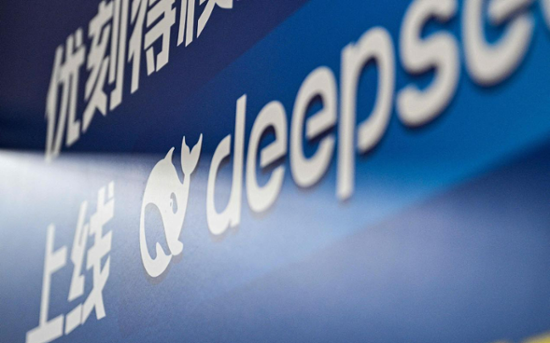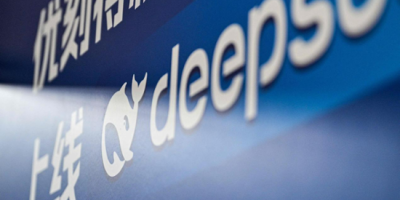
The logo of Deepseek is seen during the Global Developer Conference, organized by the Shanghai AI Industry Association, in Shanghai, Feb. 21. AFP-Yonhap

DeepSeek’s AI leap is a milestone innovation breakthrough for China but it does not change the overall leading position of the United States in the field of artificial intelligence, a prominent adviser to Beijing said.
While the rise of DeepSeek has “naturally spawned a wave of strong nationalist sentiment,” Beijing should be sober that it still lags far behind the U.S. in tech and data quality, warned Zheng Yongnian, dean of the school of public policy at the Chinese University of Hong Kong’s Shenzhen campus (CUHK-Shenzhen).
“Excessive nationalism would be detrimental for China in the fiercer tech competition down the road,” Zheng posted on a social media account maintained by CUHK-Shenzhen on Friday.
DeepSeek, which is based in the eastern city of Hangzhou, stunned the world by releasing two groundbreaking AI models — the V3 large-scale language model in December and the R1 inference model — last month. These open-source models perform on par with leading chatbots developed by U.S. tech giants, such as OpenAI and Google, but are cheaper to train.
Chinese state media has been quick to champion the private company as a national asset in the country’s competition for AI supremacy.
People’s Daily, the mouthpiece of the Communist Party, called it “a testament to China’s swift tech adoption, vision and unyielding drive for innovation” amid chip export sanctions by the U.S. and its allies.
Zheng said that while the success of DeepSeek deserved the tributes, a populist mentality was not conducive to China’s AI development. He noted that there remained a big gap between Beijing and Washington in chip technology and data quality, “which is equally important — we need to be clear what DeepSeek has not changed.”
He said China was still incapable of producing advanced semiconductors, which were critical for the competitiveness of various sectors, from manufacturing to national defense.

Zheng Yongnian, dean of the school of public policy at CUHK-Shenzhen / Courtesy of The Chinese University of Hong Kong, Shenzhen
Zheng said that while the U.S. had data from all over the world, China’s large amount of data was “isolated” because of the “limited openness of the internet” and it was difficult to integrate data between companies, government departments and regions.
In a bid to gain an edge in the future-tech contest, China should change the practice of AI overregulation and shift the emphasis to AI development, he said.
“To catch up with the U.S., China needs to moderately relax regulation, if not completely ‘deregulate’ like the U.S.,” he wrote. “It is precisely because of [overregulation] that China is also losing a lot of AI talent to other countries, especially the U.S.”
Currently, all generative AI algorithms and products must go through security testing and review by the Cyberspace Administration of China before they can be made available to the public.
China has been drawing up a unified AI law, with a draft submitted for review to the country’s top legislative body, the National People’s Congress Standing Committee last year. However, it has been shelved because of considerable disagreement within both the industry and academic communities, legal experts involved in discussions said.
Zheng also said China should have a national policy that AI models were open source.
“Many Chinese companies originally developed their products on the basis of Western open source. But many of the end products of theirs turned out to be closed source. This actually limits the improvement of companies’ technological level, and in the long run they will inevitably fall behind,” he said.
Loosened regulations and keeping products open source were important for China which faced “suppression from the US” and an AI catch-up phase by Europe, Japan, India and other countries, he wrote.
Read the full story at SCMP.














